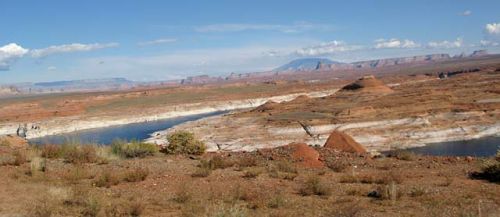
After hitting the road in 2007, I was faced with the eye-opening reality that most of America hasn’t embraced the eco-groovy conscientiousness of my former Northern California community. But after putting a few miles under my belt I learned that while most large cities have implemented earth-friendly practices like city-wide recycling, for small towns it’s often financially unfeasible to follow in their footsteps. I can understand that, but getting used to the act of dumping recyclable items into the trash was a big psychological adjustment I had to make when I chose this lifestyle.
I’ve talked to some of my eco-conscious full-timing friends about this, and many of them will save their discarded recyclables until they reach a recycling station. However my rig just isn’t large enough to keep bottles, cans and plastic on board – every square inch of space is being used for either personal gear or work implements. To make up for the many recyclables we toss into the garbage, Jim and I commit to eco-friendly practices in other areas of our full-timing life. For example:
We limit the use of paper goods. Call me a tree-hugger, but when I eat off a paper plate or use a paper towel, I can’t help but envision the beautiful trees that were felled for this short-sighted convenience. In my mind, each time I choose a cloth napkin and a real plate over disposable ones, another tree gets to stay standing in the forest. About the only time I will use paper plates and towels is when we’re dry camping without easy access to water.
We conserve water. One look at the current water level of Lake Powell (pictured here) and you’re instantly reminded that water is a non-renewable, precious resource. Conserving water while dry camping is a no-brainer but we save water in other ways even when we’re hooked up to utilities. For example, we don’t use water to wash or rig but instead use a great waterless-wash product called “DriWash.”
We Go Solar. Investing in a solar power system for our rig was the best RVing decision we ever made. Our system allows us to unhook from the grid and be more independent of fossil fuels wherever we choose to camp. Instead of continuously running our generator and creating noise and fumes while dry camping in the wilderness, we use only use it for an hour or so at night to top-off our house batteries.
We Drive Less. Full-timers usually drive far less miles than the average commuter who lives in the suburbs. When full-timers do drive, we drive a lot to get from Point A to Point B, but once we arrive we usually stick around and keep car trips to a minimum. Combining all of our errands into a one-day excursion to town has become second nature and we no longer jump in the car just for a quick trip to the grocery store.
In addition to these full-timing habits we’ve implemented, we strive to make less of an impact on the planet by being conscientious about other areas of our lives, such as choosing a plant-based diet, buying recycled products whenever possible and only using non-toxic cleaners in the home. Even if we can no longer participate in regular recycling, it helps me feel better knowing that we’re still putting the future of our planet at the forefront of our minds wherever we travel.
Do you recycle on the road or practice eco-friendly habits? If so, what are they? I’d love to hear your ideas!

Leave a Reply